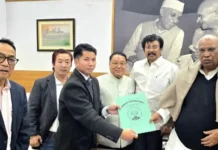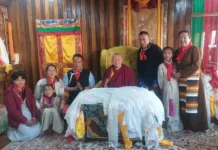Flights Of Fantasy
[ M Panging Pao ]
Many Arunachalee old-timers recall the 1962 Sino-India conflict with fear and anger. The Chinese forces entered deep into Arunachal Pradesh along many axes like Taksing-Limeking, Mechuka/Manigong-Tato, Gelling-Tuting, Kibithoo-Walong axes and the main Tawang-Bomdila-Rupa axis. Many readers are not aware of fierce battles fought by our brave soldiers. One such story is the story of major Mahabir Prasad.
Captain Mahabir Prasad, a young officer of the 1 Sikh Regiment, performed repeated acts of bravery and tenacity during the whole period of operations in the Namka Chu area north of Tawang in Arunachal Pradesh before and during the war. In the years preceding the 1962 Sino-India war, the Indian government led by then Prime Minister Jawaharlal Nehru adopted the infamous Forward Policy against the Chinese. The Forward Policy was enforced by certain misinformed political and military leaders who wrongly assessed that the Chinese would not retaliate. In line with the Forward Policy, under orders from higher authorities, captain Mahabir Prasad was responsible for establishment of the infamous Dhola Post in June 1962. The establishment of Dhola post led to immediate reaction by the Chinese, who claimed that Dhola post was north of the McMahon Line and soon 600 Chinese soldiers surrounded the post. Skirmishes with sporadic firing began by 20 September, 1962.
The skirmishes continued and soon escalated into a full scale war. On 20 October at 5:14 am, Chinese 150 guns and mortars opened upon all the localities at Namka Chu and Tsangdhar. Major Mahabir Prasad was attached with the 1/9 Gorkha Rifles deployed in that area. Intense fighting ensued and the troops fought back the initial attacks. In the evening, 500 Chinese troops attacked the positions with heavy artillery, mortar and other medium machine guns. Major Mahabir Prasad led a handful of men against the waves of advancing Chinese and inflicted heavy losses on the enemy. Major Mahabir Prasad fought valiantly along with his troops and the enemy advance was halted for many hours. However, major Mahabir Prasad got wounded seriously during the attack. Even after being seriously injured, major Mahabir Prasad kept fighting and motivated his troops. Finally, major Mahabir Prasad succumbed to his injuries and was martyred in the intense battle.
As per many experts, the 1962 Sino-India war was triggered by the Dhola post incident which was established by major Mahabir Prasad. For his exceptional courage, tenacity and gallantry during the war, major Mahabir Prasad was awarded the nation’s second highest gallantry award, the Maha Vir Chakra. Salute to major Mahabir Prasad! (The contributor is retired Group Captain, Indian Air Force)



